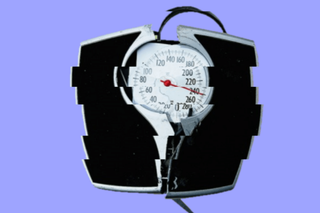
Most People Will Regain Weight After Losing It; Here’s Why
Scientists are looking into what, exactly, causes the changes to metabolism behind yoyo weight loss.

In 2016, a study of participants on the reality weight-loss show The Biggest Loser revolutionized what we know about dieters and weight loss: Six years after the show’s filming ended, nearly every participant had regained the weight they had lost during the show.
The researchers discovered drastic weight loss — accomplished on the show through a mix of extreme dieting and exercise — causes metabolic changes that make it near-impossible to maintain a new, lighter weight. The finding confirmed and partially explained an earlier study that found more than 80% of people who lose a significant amount (10%) of body weight will regain at least some of the lost weight within a year. In doing so, The Biggest Loser study also destigmatized yoyo weight loss — before, weight regain after a diet was blamed on a lack of individual willpower. But while the study revealed the physiological changes that make maintaining a lighter weight difficult, it didn’t explain them. Now, a handful of new studies, collected and detailed by Daniel Engber in an article for the journal Nature Medicine, is shedding light on what underpins the metabolic changes that keep many people on the tortuous carousel of diet culture.
Related on The Swaddle:
Could Intuitive Eating End Diet Culture?
“The one point on which nearly all researchers agree is that the physiology of weight regain, like the physiology of obesity itself, is almost certain to reflect a very complicated mix of factors ranging from genetics to behavior and the environment,” Engber writes.
One of the factors many researchers have been focusing on is the level, production, and effect of the hormone leptin, which is secreted by fat cells and signals to our brains that we ‘feel full.’
One study of participants attempting to lose weight through severe calorie restriction (limited to only 500 calories a day) caused leptin levels to drop by two-thirds during the diet — in other words, it left participants with an impaired neural ability to switch from hungry to full. While leptin levels crept back up after the diet ended, they remained suppressed by one-third for up to a year, leaving the former dieters hungrier, perhaps, than they would be normally — and thus facilitating weight gain.
But even this doesn’t fully explain weight regain after a diet — because what, after all, causes the fluctuations of leptin in dieters?
Engber highlights research that has found fat cells change shape after significant weight loss. In fact, fat cells appear to shrink, pulling away from the material that binds them together — the stress of which inhibits further fat loss, potentially by causing chronic inflammation and affecting the cells’ ability to secrete leptin properly, the researchers behind the study speculate; impaired leptin secretion would prime people who have lost weight to eat more.
But the researchers stress that the degree to which fat cells might respond in this manner would vary from person to person, bringing us to the holy grail of scientific research: the genome.
There is no single ‘obesity gene’ but genetic studies have linked certain genes’ functioning to a higher risk of obesity; that said, subsequent research hasn’t provided any proof that the same functioning of the same genes predicts yoyo weight loss. (However, Engber notes, the latter studies, of which there are fewer, represent quite a small number compared to the former, which has been researched for years already — so maybe not enough samples and research have accumulated yet.)
Even if the genes associated with obesity are found to also predict difficulty maintaining weight loss — or even if a set of other genes are — it’s doubtful whether it will mean much, given all the other factors at play. “That means we’re unlikely to find any magic-bullet method for keeping pounds from coming back. Indeed, some degree of rebound may be more or less inevitable for the majority of dieters,” Engber writes.
While this may be frustrating for those working hard to achieve a healthier weight, the good news is that even yoyo weight loss may have benefits: Engber cites a mouse study that found obese mice who lost significant amounts of weight, then regained some of it, then lost it again, etc., lived longer than mice who remained obese throughout the study.
Ultimately, this may mean that the benefits of major weight loss lie in the journey, not the end-weight. Accepting the science behind this (and parsing it further) can put an end to the kind of fat-shaming diet culture that makes us feel bad about ourselves when we regain weight after a diet, and promote a long-view of weight and good health — which like anything in life, is full of ups and downs.
Liesl Goecker is The Swaddle's managing editor.
Related


Policies Aimed at Cleaner Air Result in Better Health Almost Immediately: Study
